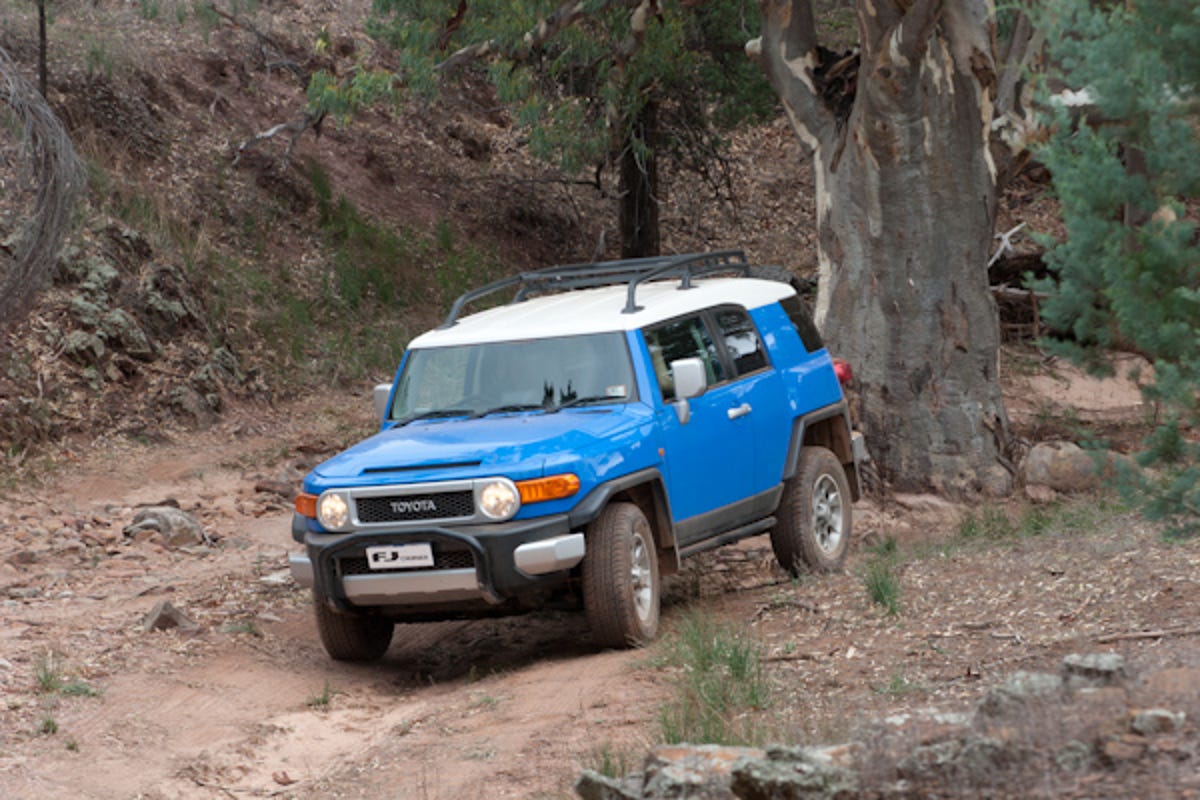Off-roading basics
This sunburnt country is so vast and wide that to see many of its best features you need to head off road. Here are some basics to consider before you head off the beaten track.

Picking the right vehicle
This sunburnt country is so vast and wide that to see many of its best features you need to head off road. Here are some basics to consider before you head off the beaten track.
This list is far from comprehensive, so check back later this week when we'll have a video feature from the four-wheel driving course that was the main prize in our recent Toyota FJ Cruiser competition.
You wouldn't send a bog-standard Cruze out to compete in a 24-hour race, similarly you shouldn't try to tackle the Simpson Desert in a CR-V or Kluger.
Before embarking, make sure that your off-roader is up to the task and in good working order. Cars like the Toyota FJ Cruiser, Prado, Nissan Patrol, Mitsubishi Pajero, Land Rover Discovery and Jeep Cherokee are all well suited to serious off-road work.
Supplies
Australia is a hot, dry, dusty place at the best of times, so bring plenty of water. You'll probably need at least three litres per person per day for drinking alone.
Fuel
Make sure that you fill up when you can and that you have enough fuel to last you until your next encounter with a petrol station.
Plan
As far as four-wheel driving goes, Benjamin Franklin said it best: "By failing to prepare, you are preparing to fail."
As with many aspects of modern life, the internet is your best friend. Forums and websites abound, and allow novices and experts alike to find out all one needs to know about possible routes.
Travel in packs
On any off-road trip, you're likely to get stuck, which makes travelling with another vehicle essential. They'll also save you should a worst-case scenario occur, such as a break down or becoming impossibly stuck.
Snatch
Having another four-wheel drive on hand makes getting unstuck a lot easier.
Understand
Many of us drive around in cars and operate phones and computers that we have little working knowledge of. And, most of the time, everything works fine and everyone goes to sleep happy.
But when you're heading off road, it's good to know how your four-wheel drive works and what some of its basic features are for. For instance, ask yourself: do you know the difference between low- and high-range four-wheel drive?
Learn the basics, at least
If you and the rest of your off-roading crew have never been on anything more challenging than a gravel road, money spent on an off-roading course will not be wasted.
Course work
Apart from teaching you the basics of off-roading, going on a course will give you some first-hand experience. Trust us, the first time you arrive at a hill's summit and all you can see is blue sky and the horizon, it can be more than a bit nerve-wracking.
Thumbs out
Hooking your thumbs into a steering wheel's spokes is something we do instinctively. Off road, though, it could cause you a nasty injury if you hit an obstacle.
Going down
Part of learning how to drive off road is unlearning some of what one already knows about driving. For example, it's natural to want to stand on the brakes, especially when you're heading down a massive decline. As long as you're in low-range four-wheel drive, though, it's not necessary and, in fact, can be detrimental.
Crossing the Ganges
Water crossings look great and are fun, there's no denying that, but they're fraught with peril, so avoid them when you can. If a crossing can't be helped, make sure the current isn't too fast and that you plan your line out in advance. That way you can avoid any large objects or big dips. Depending on the level of water clarity, you may even need to traverse the crossing on foot first.
Walk then run
For your first off-road adventure, don't attempt to cross the Simpson Desert (above) or the Birdsville Track. Even after taking a four-wheel driving course there's still much to learn.
Go clubbing
No, not one of the all-night, drink your problems away variety. Joining a four-wheel drive club is a great way of meeting like-minded folks. Some, like the Land Cruiser Club of Australia, have properties with four-wheel drive tracks on which you can hone your skills and test the limits of your vehicle in a controlled environment.
First aid
Unlike a regular holiday, you can't just pop down to the local supermarket or pharmacy. Bring along a first aid kit, as well as any medicines or supplements you regularly take. And, as with water, take more than you think you'll need.
Stay in contact
In the bush, away from population centres, mobile phone reception can range from patchy to non-existent. A CB radio can be handy for getting in contact with any other off-roaders nearby, but for more arduous and remote journeys a satellite phone is a must.
Let 'em know
Inform your friends and loved ones of where you're going, roughly how you're getting there and when you plan to arrive. That way, should you fail to turn up, they can raise the alarm.
Also, don't be afraid to let locals and park rangers know where you're intending to go. The more people that know, the merrier.
Turn back
If the track looks impassable, don't be afraid to turn back. Dented ambition is better than a seriously dented vehicle.

